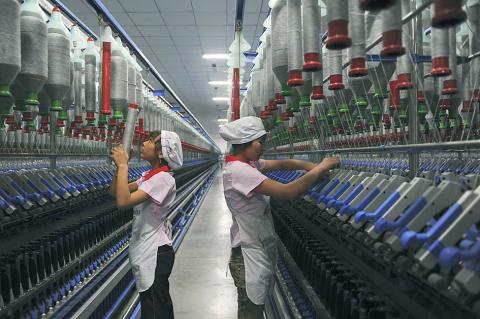China’s manufacturing activity rose to the highest level in a year, official data showed yesterday, but analysts tempered their enthusiasm, saying the world’s second-largest economy was still slowing.
The official purchasing managers index (PMI) rose to 53.1 last month from 51 in February, helped by an increase in new orders, the China Federation of Logistics and Purchasing said in a statement.
It marked the fourth consecutive month of expansion for manufacturing activity. A reading above 50 indicates industry is expanding, while a reading below 50 suggests it is contracting.

Photo: Reuters
The latest figure approached a level not seen since March last year, when PMI reached 53.4, previous data showed. The latest number also beat analysts’ median forecast of 50.5, according to Dow Jones Newswires.
“PMI tends to pick up in March every year ... so it is important not to view this as a sign of out-and-out strength,” Beijing-based IHS Global Insight economist Alistair Thornton said in a research note.
“At the very least, things are not getting worse,” he added.
China’s economy is widely expected to slow this year as woes in key export markets, such as Europe and the US, hit its overseas sales.
The government last month set a target for 7.5 percent economic growth this year. China’s economy grew 9.2 percent last year and 10.4 percent in 2010.
Zhang Liqun (張立群), a researcher at government think-tank the Development Research Center, warned overall economic growth was still slowing.
“Future economic growth will still experience a slowdown,” he was quoted as saying in the official PMI statement issued by the industry group.
Analysts said manufacturing activity typically picks up in March with the arrival of spring and following an annual meeting of lawmakers during the month, which sets economic policy for the coming year.
“The government’s PMI may have been affected by seasonal factors, so the reality may not be as good,” Nomura Securities chief China economist Zhang Zhiwei (張智威) said.
A separate reading of PMI also released yesterday by British banking giant HSBC PLC showed a less optimistic picture than the official figure.
HSBC’s PMI fell to 48.3 last month from 49.6 in February, marking the fifth month manufacturing activity has remained in contraction, the bank said in a statement.
Analysts say the HSBC survey puts more emphasis on smaller companies, which are suffering more in the economic downturn than state-owned giants.
The government will still need to loosen credit this year to offset the economic slowdown, though any move could be delayed given the better-than-expected official PMI figure, ANZ Research said.
The central bank in February cut the amount of cash banks must hold in reserve for the second time in three months as policymakers moved to increase lending and boost domestic consumption amid the economic slowdown.
Beijing has pledged to “fine-tune” policy to prevent a hard landing for the economy, which could trigger widespread job losses and spark social unrest.

With an approval rating of just two percent, Peruvian President Dina Boluarte might be the world’s most unpopular leader, according to pollsters. Protests greeted her rise to power 29 months ago, and have marked her entire term — joined by assorted scandals, investigations, controversies and a surge in gang violence. The 63-year-old is the target of a dozen probes, including for her alleged failure to declare gifts of luxury jewels and watches, a scandal inevitably dubbed “Rolexgate.” She is also under the microscope for a two-week undeclared absence for nose surgery — which she insists was medical, not cosmetic — and is

CAUTIOUS RECOVERY: While the manufacturing sector returned to growth amid the US-China trade truce, firms remain wary as uncertainty clouds the outlook, the CIER said The local manufacturing sector returned to expansion last month, as the official purchasing managers’ index (PMI) rose 2.1 points to 51.0, driven by a temporary easing in US-China trade tensions, the Chung-Hua Institution for Economic Research (CIER, 中華經濟研究院) said yesterday. The PMI gauges the health of the manufacturing industry, with readings above 50 indicating expansion and those below 50 signaling contraction. “Firms are not as pessimistic as they were in April, but they remain far from optimistic,” CIER president Lien Hsien-ming (連賢明) said at a news conference. The full impact of US tariff decisions is unlikely to become clear until later this month

GROWING CONCERN: Some senior Trump administration officials opposed the UAE expansion over fears that another TSMC project could jeopardize its US investment Taiwan Semiconductor Manufacturing Co (TSMC, 台積電) is evaluating building an advanced production facility in the United Arab Emirates (UAE) and has discussed the possibility with officials in US President Donald Trump’s administration, people familiar with the matter said, in a potentially major bet on the Middle East that would only come to fruition with Washington’s approval. The company has had multiple meetings in the past few months with US Special Envoy to the Middle East Steve Witkoff and officials from MGX, an influential investment vehicle overseen by the UAE president’s brother, the people said. The conversations are a continuation of talks that

CHIP DUTIES: TSMC said it voiced its concerns to Washington about tariffs, telling the US commerce department that it wants ‘fair treatment’ to protect its competitiveness Taiwan Semiconductor Manufacturing Co (TSMC, 台積電) yesterday reiterated robust business prospects for this year as strong artificial intelligence (AI) chip demand from Nvidia Corp and other customers would absorb the impacts of US tariffs. “The impact of tariffs would be indirect, as the custom tax is the importers’ responsibility, not the exporters,” TSMC chairman and chief executive officer C.C. Wei (魏哲家) said at the chipmaker’s annual shareholders’ meeting in Hsinchu City. TSMC’s business could be affected if people become reluctant to buy electronics due to inflated prices, Wei said. In addition, the chipmaker has voiced its concern to the US Department of Commerce